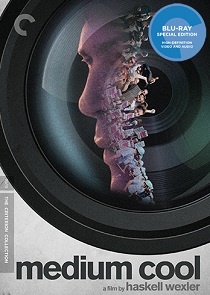 “Look out, Haskell, it’s real!”
“Look out, Haskell, it’s real!”
That’s legendary cinematographer Haskell Wexler’s assistant, heard on the soundtrack as tear gas is thrown into the crowd at the 1968 Chicago Democratic Convention protests.
Ten years before he lensed the lush outdoor images of Terrence Malick’s Days of Heaven, Wexler directed Medium Cool, a fictional narrative that combined actual documentary footage of the riots and other lightning-rod political moments to explore the blurred lines between fact and fiction.
The Criterion Collection has released Medium Cool on DVD and Blu-ray with a whole host of fascinating special features that illuminate the ideas and thought processes behind a film that was truly ahead of its time.
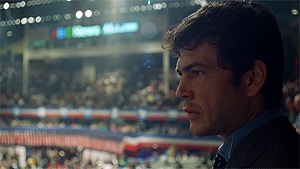 Robert Forster plays John Cassellis, a TV photojournalist that is becoming increasingly detached from his role as a human being the further he embraces his ethos: He is there to record life as it plays out and turn the footage in on time. When he begins a relationship with a young Vietnam War widow (Verna Bloom) and social tensions escalate before his eyes, he struggles to maintain that “professional” distance.
Robert Forster plays John Cassellis, a TV photojournalist that is becoming increasingly detached from his role as a human being the further he embraces his ethos: He is there to record life as it plays out and turn the footage in on time. When he begins a relationship with a young Vietnam War widow (Verna Bloom) and social tensions escalate before his eyes, he struggles to maintain that “professional” distance.
There is a vague romantic subplot that surrounds Medium Cool, but Wexler leaves the details of the relationship up to interpretation. Scenes have an improvisatory feel that matches the documentary-style footage of the rest of the film. Wexler isn’t concerned with plot mechanics, other then the central theme of Cassellis’ creeping social conscience.
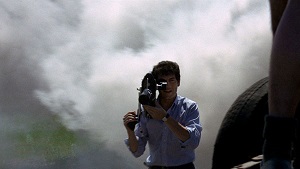 The potent combination of cinéma vérité with cast members playing fictional characters amidst that footage calls into question the very nature of truth on film, while at the same time commenting on a disturbing cultural need to see sensational incidents unfold before the camera.
The potent combination of cinéma vérité with cast members playing fictional characters amidst that footage calls into question the very nature of truth on film, while at the same time commenting on a disturbing cultural need to see sensational incidents unfold before the camera.
Despite the 1968 conflict(s) dating the film to a very specific time and place in American history, there’s nothing about Medium Cool that can’t be applied to what’s going on today, especially with the new relevance of video images on computers and handheld devices. Our lives are spent constantly interpreting moving pictures, often subconsciously.
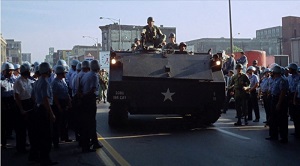 The film’s title, of course, refers to Marshall McLuhan’s critique of TV in Understanding Media, where he describes it as “cool,” that is, a medium that requires active participation from the viewer to fill in the details and determine meaning.
The film’s title, of course, refers to Marshall McLuhan’s critique of TV in Understanding Media, where he describes it as “cool,” that is, a medium that requires active participation from the viewer to fill in the details and determine meaning.
Wexler, an activist and cinematographer himself (he had already won an Oscar for Who’s Afraid of Virginia Woolf? and had recently shot In the Heat of the Night), was deeply interested in the way cameras and storytelling had been used during the social upheaval of the late 60s.
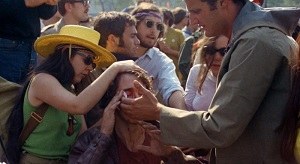 Although much of Medium Cool was self-financed, it was released by Paramount. When the studio finally saw the finished product, however, they were worried and delayed the release until late August 1969. The MPAA gave it an “X” rating, presumably because of its controversial political content, but Medium Cool was eventually knocked down to an “R” the following year.
Although much of Medium Cool was self-financed, it was released by Paramount. When the studio finally saw the finished product, however, they were worried and delayed the release until late August 1969. The MPAA gave it an “X” rating, presumably because of its controversial political content, but Medium Cool was eventually knocked down to an “R” the following year.
Criterion’s restored 4K transfer of Medium Cool looks way better than the old Paramount-issued DVD (where I first saw the film) and contains a big helping of illuminating extras. There’s two commentaries—one from film historian Paul Cronin and the other from Wexler, editorial consultant Paul Golding, and co-star Marianna Hill (sadly, Forster is absent)—and excerpts from two Cronin-made documentaries, including the acclaimed Look Out Haskell, It’s Real!
Wexler also surfaces in a new interview and a new 30-minute video about the 2012 NATO Summit protests in Chicago.








Comments on this entry are closed.